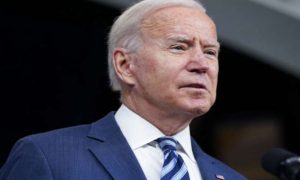The House January 6 select committee’s unanimous move to subpoena Donald Trump, demanding that he testify about his knowledge of the Capitol attack, sets up the prospect of a political spectacle as the congressional investigation races towards what could be an explosive conclusion.
The former US president may decide to ignore the subpoena and decide not to cooperate with the inquiry, or alternatively, believing that he is his own best spokesman and can answer for his actions to anyone, may agree to a dramatic deposition.
But whatever path Trump chooses, the decision of constitutional consequence appears certain to also become a pitched political spectacle – with each side seeking to achieve their own goals as the congressional investigation into the Capitol attack prepares to finish its work.
The driving factor pushing Trump to want to testify has centered around a reflexive belief that he can convince investigators that their own inquiry is a supposed witch-hunt and convince them that he committed no crimes over January 6, according to sources familiar with the matter.
Trump has previously expressed an eagerness to appear before the select committee and “get his pound of flesh” as long as he can appear live before an audience, the sources said – a thought he reiterated to close aides on Thursday after the panel voted to issue him a subpoena.
But Trump also appears to have become more aware about the pitfalls of testifying in investigations, with lawyers warning him about mounting legal issues in criminal inquiries brought by the justice department and a civil lawsuit brought by the New York state attorney’s office.
The former president invoked his fifth amendment right against self-incrimination more than 440 times in a deposition with the New York state attorney’s office before it filed a fraud lawsuit against him, three of his children, and senior Trump Organization executives.
Trump also ultimately took the advice of his lawyers during the special counsel investigation into ties between his 2016 campaign and Russia, submitting only written responses to investigators despite initially telling advisers he wanted to testify in person to clear his name.
The issue for Trump with the select committee remains whether the panel would accept a demand to testify live. The select committee has rejected testimony with conditions for virtually all witnesses, with the exception of former Trump White House aide Cassidy Hutchinson.
If Trump does make his appearance contingent on conditions that the select committee cannot countenance, it is not clear what options are available to compel his testimony given his position as a former president.
The chairman of the select committee, congressman Bennie Thompson, said in advance of the vote to issue Trump a subpoena that chief among the reasons the panel sought his testimony was because his singular role in driving events towards January 6 necessitated full accountability.
Members on the select committee believe securing Trump’s testimony could answer several unresolved issues – such as his contacts with political operatives at the Trump war room at the Willard hotel, sources say – but Thompson added it went beyond evidence-gathering.
“He must be accountable. He is required to answer for his actions,” Thompson said.
But the select committee is expected to face difficulty should it seek to enforce its subpoena through the courts, with Trump’s lawyers focusing on the justice department’s office of legal counsel opinions contending that former presidents have absolute immunity from testifying to Congress.
The panel’s previous attempts to force Trump White House officials to comply with subpoenas have resulted in protracted legal battles over executive privilege that were mostly resolved through some partial cooperation, such as with Trump’s former chief of staff Mark Meadows.
Attempts to seek judicial enforcement against Trump would be even more time-consuming and given the justice department’s internal position on absolute immunity – a stronger protection than executive privilege – the effort might be wholly unsuccessful, legal experts said.
The select committee could alternatively refer the former president to the justice department for contempt of Congress as it did with former aides Steve Bannon and Peter Navarro, but the justice department would probably decline to prosecute on the immunity standard, the experts said.
The calculus appears to leave Trump with a political prisoner’s dilemma, one person directly familiar with the investigation said – adding that they believed the panel will be perceived in history as having done as much as it could to uncover Trump’s connection to the Capitol attack.





























